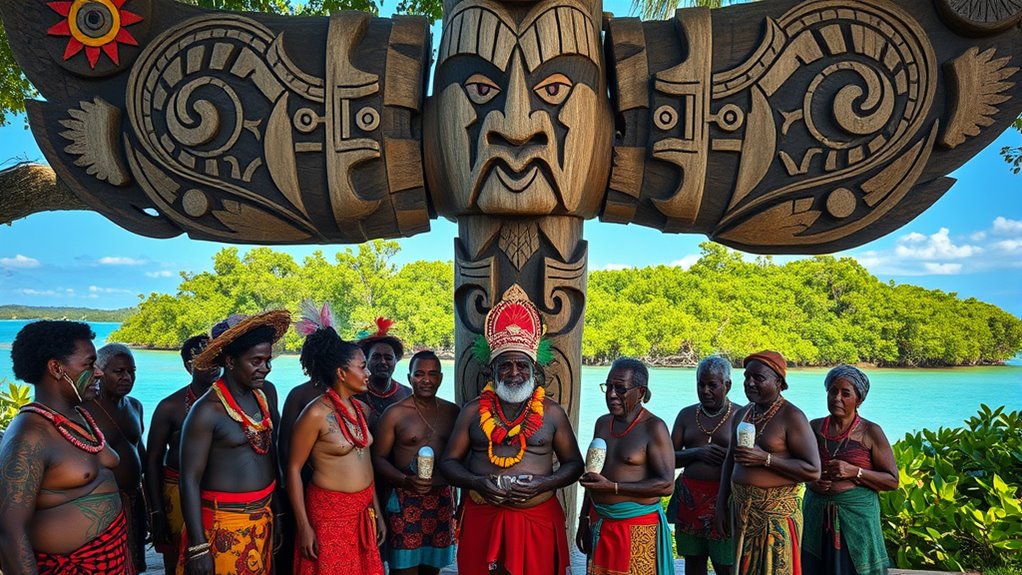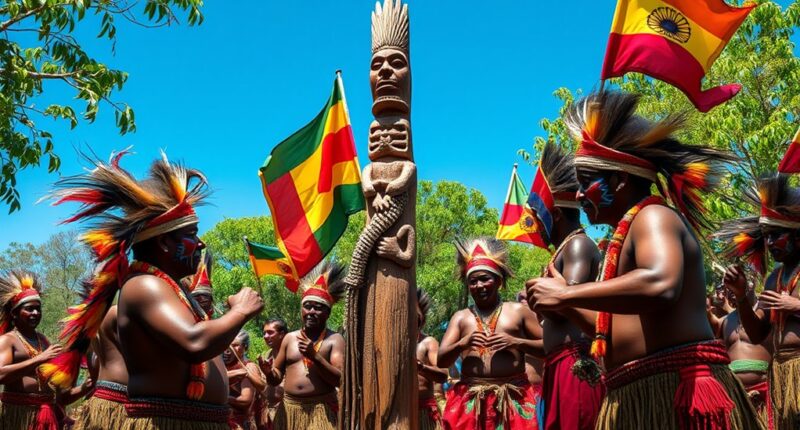Ailan Kastom refers to the unique legal and cultural traditions of Torres Strait Islander communities, shaping their social roles, land use, and ceremonies. It governs daily life through customary laws passed orally and reinforced by elders, emphasizing community consensus, kinship, and spiritual ties to land and ancestors. These traditions help maintain identity, social harmony, and resilience. Exploring further reveals how Ailan Kastom continues to influence contemporary life and governance in these vibrant communities.
Key Takeaways
- Ailan Kastom encompasses traditional laws and customs that govern land, resource use, marriage, and social behavior within Torres Strait communities.
- These customary laws are transmitted orally, maintained through community consensus, and upheld by elders and traditional leaders.
- They reinforce social bonds, preserve cultural identity, and connect communities to land and ancestors through ceremonies and rituals.
- Land ownership is often communal, with specific inheritance rules reflecting traditional property rights and kinship ties.
- Ailan Kastom plays a vital role in maintaining social harmony, cultural resilience, and the spiritual connection to land and ancestors.

Have you ever wondered how the unique customs of Ailan Kastom shape the daily lives and identity of the people on the islands? Ailan Kastom is more than just a set of traditions; it’s the foundation of how the community functions, governs itself, and preserves its cultural heritage. Central to this way of life are indigenous ceremonies, which serve as essential expressions of identity and continuity. These ceremonies aren’t just rituals; they’re a way to honor ancestors, mark important life events, and reinforce social bonds. During these events, you’ll witness traditional dances, music, and storytelling that pass down values and history from generation to generation. Participating in or observing these ceremonies gives you a glimpse into the deep spiritual connection the people have with their land and ancestors.
At the core of Ailan Kastom are customary laws that govern daily behavior, dispute resolution, and social responsibilities. These laws are not written in books but are passed orally and practiced through community consensus. They regulate everything from who can hunt or fish in certain areas to how conflicts are resolved. When you understand these laws, you realize they are flexible enough to adapt to changing circumstances but robust enough to maintain social harmony. These laws are embodied in the community’s shared understanding of right and wrong, and they’re upheld through respect for elders and traditional leaders who serve as custodians of Kastom. Vetted – Grobal World
Customary laws also influence property rights, marriage, and kinship ties. For example, land ownership is often communal, with specific rules about who can use or inherit land. Marriage customs may involve elaborate ceremonies rooted in ancestral traditions, emphasizing the importance of family ties and community approval. By respecting these laws, the community preserves its cultural integrity and ensures that everyone knows their roles and responsibilities.
Living within the framework of indigenous ceremonies and customary laws, the people of the Torres Strait maintain a strong sense of identity. These traditions provide structure and meaning to everyday life, linking the past with the present. For outsiders, understanding these customs might seem complex, but they are the living heartbeat of the community. They form a resilient, dynamic system that sustains the cultural fabric of the islands, ensuring that the spirit of Ailan Kastom endures for future generations.
Frequently Asked Questions
How Are Ailan Kastom Laws Enforced Today?
You see that Ailan Kastom laws are still enforced today through traditional ceremonies and dispute resolution methods. When conflicts arise, community elders often mediate using customary practices, emphasizing harmony and respect. These ceremonies reinforce cultural values and help resolve disagreements without involving formal legal systems. By maintaining these traditions, you help preserve the unique legal heritage of the Torres Strait, ensuring that Ailan Kastom remains an essential part of community life.
Do Ailan Kastom Laws Conflict With Australian Federal Law?
Like two rivers converging, legal conflicts can flow between Ailan Kastom laws and Australian federal law. You might find that Ailan Kastom’s emphasis on cultural sovereignty sometimes clashes with national legislation, creating tensions. While efforts exist to respect both systems, conflicts can arise, requiring careful navigation to honor traditional customs without undermining Australian law. Recognizing these differences helps you appreciate the delicate balance maintained in Torres Strait communities.
Can Non-Indigenous People Participate in Ailan Kastom Ceremonies?
You might wonder if non-Indigenous people can participate in Ailan Kastom ceremonies. Generally, cultural participation and ceremony involvement are reserved for community members and those invited by local elders. Respect is key; engaging without permission can be disrespectful. If you’re interested, it’s best to approach with humility and seek guidance from community leaders. This guarantees your involvement respects their traditions and maintains the integrity of the ceremonies.
How Are Disputes Traditionally Resolved Under Ailan Kastom?
When disputes arise, you’re likely to see mediation methods used, emphasizing community harmony. Community councils often step in to facilitate discussions, helping the parties reach an agreement. These councils play a crucial role in resolving conflicts respectfully and collaboratively, respecting traditional customs. By involving community members directly, Ailan Kastom prioritizes reconciliation and social cohesion, ensuring disputes are settled in a manner consistent with Torres Strait Islander values and traditions.
Are Ailan Kastom Practices Recognized Legally Outside Torres Strait?
Imagine the tension when traditional practices face the wider world. You wonder if Ailan Kastom practices gain cultural recognition outside Torres Strait. The answer isn’t straightforward; some aspects are recognized through legal integration, especially where indigenous rights are involved. While full legal acknowledgment remains limited, efforts continue to bridge these traditions with national law, ensuring that these unique customs are respected and preserved beyond their original communities.
Conclusion
Just as a coral reef weaves countless vibrant threads into a resilient tapestry, Ailan Kastom forms the intricate fabric of Torres Strait’s identity. By understanding and respecting these unique legal traditions, you help preserve a cultural treasure that’s as essential as the ocean itself. Embracing this knowledge ensures the legacy continues to thrive, anchoring future generations in the rich depths of their ancestral roots. Keep the currents of tradition flowing strong, and the true spirit of Ailan Kastom will endure.









